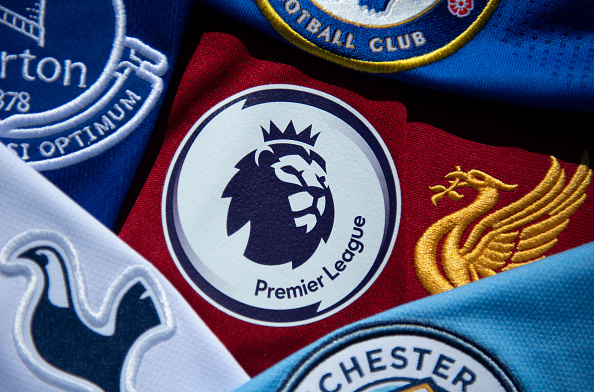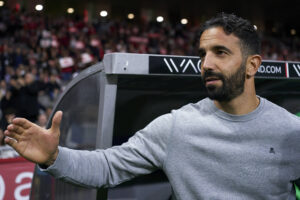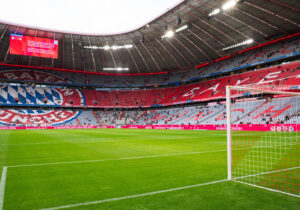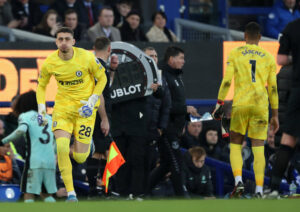Well it was only a matter of time, wasn’t it? Last week it was revealed that Premier League giants Manchester United are to soon unveil a new sponsorship partner for their training kit in the shape of blockchain platform Tezos. Don’t be concerned if you’ve never heard of them, you’re not the only one.
This marks the most high-profile sponsorship deal of it’s kind yet involving a Premier League club, and brings the league further into the murky and unpredictable world of blockchain, cryptocurrency and the new kid on the block, Non-Fungible Tokens (NFTs).
Premier League Sponsorship Steeps to a New Low
Other Sponsorships
Southampton are already in a similar-type deal, with the aptly-named learncrypto.com being announced as their training kit sponsor in September much to the dismay of their fans.
Dogecoin, the meme based cryptocurrency, is the official sleeve sponsor of Watford. Training kit sponsors, sleeve sponsors, the players are basically advertisement boards on legs.
You’d think that would be enough but no. A number of clubs, namely Arsenal, Aston Villa, Crystal Palace and Everton are signed up with Socios.com, a blockchain-based “fan engagement” platform that sells “fan tokens” that entitle fans to supposed benefits at a relatively low price.
These tokens are accused by the Football Supporters Association of either trying to monetise trivial matters that could be solved with online polls or inserting financial barriers to genuine supporter engagement.
It’s inevitable that every club in the league will soon be caught up in this whirlwind, looking to capitalise on the supposed gold rush.
No Surprises in Premier League Sponsorship, Just a Shift From the Clubs
It’s hardly surprising. Morals in football were thrown out the window long ago, with the true intentions of most owners there for all to see. The thus-far unregulated metaverse of cryptocurrency is the obvious next venture, particularly given the impending clampdown on gambling advertising in the UK.
As it stands, nine of the 20 clubs in the league are sponsored by betting companies. Illustrious names such as Hollywood Bets, Fun88, Stake.com and ManBetX are emblazoned across the shirts of Brentford, Newcastle, Watford and Wolves. Anyone ever placed a bet with these? Didn’t think so.
It’s not just jerseys. Advertising hoardings at every single ground in the league are dominated by betting companies, sometimes more than one company at the same time.
With the ban set to be implemented in 2023, expect this to be replaced with the latest vice gripping the globe. The present day Premier League business plan – out of the frying pan and into the fire of shady sponsorship.
No Betting, No Problem? Not Quite
The other 11 clubs not currently sponsored by betting companies aren’t exactly clean either. Manchester City have the biggest deal in the league with Etihad Airways, the official airline of Abu Dhabi. What a coincidence.
It paints a rather bleak picture when some of the good guys these days are the banks and financial services – see Liverpool and Standard Chartered, Brighton and American Express.
Suppose Chelsea and Three Mobile isn’t too bad either, although it looks dreadful on a jersey.
Halcyon Days – Manchester United & Arsenal Lead the Way
It’s a far cry from the halcyon days of Premier League sponsorship when jerseys were remembered for the sponsor on them, and a sense of attachment somewhat grew towards whatever product or brand it was.
United’s dominance of the first decade of the Premier League is remembered for many things, one of which was their sponsorship by Sharp/Sharp Viewcam who sponsored the Red Devils for 18 years from 1982 to 2000.
Arsenal took a similar electronic goods route during the same period. In 1981 JVC became club’s first shirt sponsor, a relationship that lasted up until 1999 when Arsenal moved with the times and upgraded to a games console sponsor, and a dual one at that. Thierry Henry’s arrival was joined by that of Sega, and their Dreamcast console. Dreamcast took the home shirt while Sega adorned the away strip of the Gunners, making for an iconic set.
The two club’s fierce rivalry in this era would take on another element in the sponsorship game – United being sponsored by Vodafone from 2000-2006 and Arsenal O2 from 2002-2006. Both phone deals made for some great shots, namely Roy Keane and Cristiano Ronaldo modelling flip phones. Television Company NTL: was also prominent in this time, making for an iconic sponsor of Newcastle United and both Glasgow clubs, Celtic and Rangers.
Few Beers, Be Grand
Away from electronics, the most popular sponsor of these days was alcohol – the perceived scourge of football’s moral compass before gambling took over. Again, the Toon Army had a jersey to cherish with local brew, Newcastle Brown Ale, plastered across their kits. Plastered being the key word. You think of Liverpool in the late ‘90’s and early ‘00’s and Carlsberg immediately springs to mind, possibly alongside the Spice Boys.
Blackburn’s league title came with Alan Shearer, Chris Sutton and Kenny Dalglish but also McEwan’s Lager. Unsure if it’s still in production, however. Leeds took the cider option with Strongbow their main sponsor in the early ‘00s while Chelsea had a brief stint on the Coors in the mid ‘90s.
Yeah, I’ll Have a Pizza Hut and a Bag of Walkers Ready Salted
Other brilliant sponsors were Dr. Martens at West Ham and Ty (toys) at Portsmouth. The remainder of the much-loved and remembered sponsors came in the form of food brands – Aston Villa and Müller Yoghurts, Leicester and Walkers Crisps (local crisp, stadium name, Gary Lineker), Wolves and Doritos, fitting for the tangy cheese look to their kit, and the all-time classic of Fulham, newly promoted in ’01, championing Pizza Hut on the front of their kits.
The memories of these sponsors, and most things, are likely tinged with a hint of nostalgia but it’s hard not to long for them considering the modern day replacements. It’s no surprise that vintage kits have never been more popular.
A Dangerous Path to Take for Premier League Sponsorship
Looking ahead it’s entirely plausible that every Premier League side is embedded in crypto-currency in the not too distant future where, whether it be on the front of their jerseys, their sleeves, their shorts, their socks or their training kit equivalent. NFTs will come first, with John Terry already setting up the rather tragic “Ape Kids Club” alongside several ex-team mates. The actual clubs won’t be far behind – it will likely be the Glazers, Kroenke and Co’s latest barometer for success and latest cash heist.
The league and governing bodies are unlikely to step in and regulate it, allowing clubs to lead themselves and their fans down a dangerous path of highly-volatile finance. It’s another sign that football is more machine than man these days, more business than sport. Just a tad depressing.
Main Photo
Embed from Getty Images






